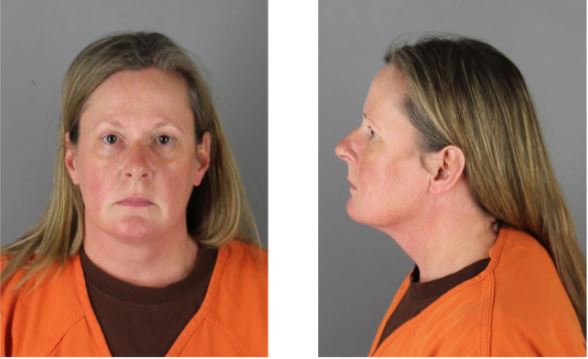One of the jurors from the Kim Potter trial has spoken out about finding the ex-cop guilty of manslaughter in the police slaying of Minnesota man Daunte Wright during a traffic stop. The unidentified juror said in a recent interview that regardless of whether Potter was a good officer and didn’t mean to kill the 20-year-old, she still committed a crime.
On Dec. 23 a Hennepin County, Minnesota, jury of six men and six women found Potter guilty of first-degree manslaughter and second-degree manslaughter in Wright’s death.

On April 11, the former Brooklyn Center policer officer shot and killed Wright as he was trying to flee a traffic stop in the Minneapolis suburb of Brooklyn Center after learning he was going to be arrested on an outstanding warrant. She thought that she was grabbing her Taser and instead grabbed and fired her gun.
The rookie cop on duty with Potter said during the trial that Wright never reached for her gun or made a threatening move, which was alleged after the incident. Potter’s bodycam captured the encounter and her yelling “Taser!” before fatally shooting the young man in his chest.
In an exclusive interview with KARE 11, the juror shared details about how the jury argued over semantics and noted that the facts were not in dispute.
As a collective, they wanted to be clear on the interpretation of the instructions they were given by the judge and the language of the law. Looking deeper into the actual language of the law challenged the person’s original opinions felt immediately after both parties’ closing arguments.
The person said the group did an initial vote, and would occasionally do “temperature checks” of each juror over the 27 hours of deliberations.
“Initially for both counts we were predominantly ‘guilty.’ For Count 1, it was seven for guilty and the remainders were either “not guilty” or didn’t know,” the juror said.
“Then for Count 2, eight said guilty, two said not guilty and two didn’t know. The day that we asked the judge what would happen if we can’t reach a decision, we were evenly split on Manslaughter 1 at four guilty, four not guilty and four ‘I have no idea.’”
The juror added, “At that point, we were just arguing semantics and kind of in circles. This case was interesting because there weren’t really facts that were in dispute. It was more our interpretation of our jury instructions and the law. Those last couple days were literally just focusing in on the language of the law.”
The fact that the jury took it so seriously was shocking to legal experts, CNN reported. Those interviewed were surprised that the jury believed they would come back with a hung jury or mistrial altogether.
Sara Azari, a criminal defense attorney told the news network, “Three to five years ago, this would be a full acquittal, not even a concern over a mistrial. So the fact that we are now seeing more accountability for officers — the idea they are not above the law, that if they do the crime, they do the time, [is great].”
The jury did not think the convicted or the victim’s character had anything to do with the outcome of the verdict. When speaking about Potter’s character, the juror said he or she didn’t believe the ex-Brooklyn Center cop was racist, a liar, or a bad person.
“I don’t think any juror felt Kim Potter was a liar, but we did get the feeling she was fighting for her life by testifying,” the juror said. “I was very surprised after the verdict came out to learn some people did not find her crying to be real. … It felt very real and tangible to me. She seemed very upset and apologetic. … It’s ludicrous that some people are assuming we thought she was a racist.”
“We felt she made a mistake, and that a mistake does not absolve you from the fact she did commit a crime. Being a good person doesn’t mean you’re above the law,” the individual stated.
While he felt compassion for Potter, he also considered the family of the deceased, saying that was the “hardest part” of the trial for him.
“We had been thinking about what this meant for Daunte Wright’s family,” the juror said.
“[For the] family, I just felt a strong sense of loss. And I know there has been this news about accusations that Daunte was not a good person. But that’s just not something we were aware of as juror members or thought of,” said the person.
“Even now that doesn’t change my opinion on the tragic loss of life that happened. I feel really bad for Daunte’s family. It was hard having them on the witness stand. You can tell Daunte meant a lot to them. And it’s hard to think about Daunte’s son. I think that’s the hardest part for me.”
The juror that interviewed with the NBC affiliate was one of twelve seated jurors.
Nine of the 12 jurors identified as white, one as Black, and two as Asian. There were also two alternates, a man and a woman, who both identify as white.
More news from our partners:
‘Nobody Is Victimizing You’ | Domonique Foxworth Comes For Aaron Rodgers Again


